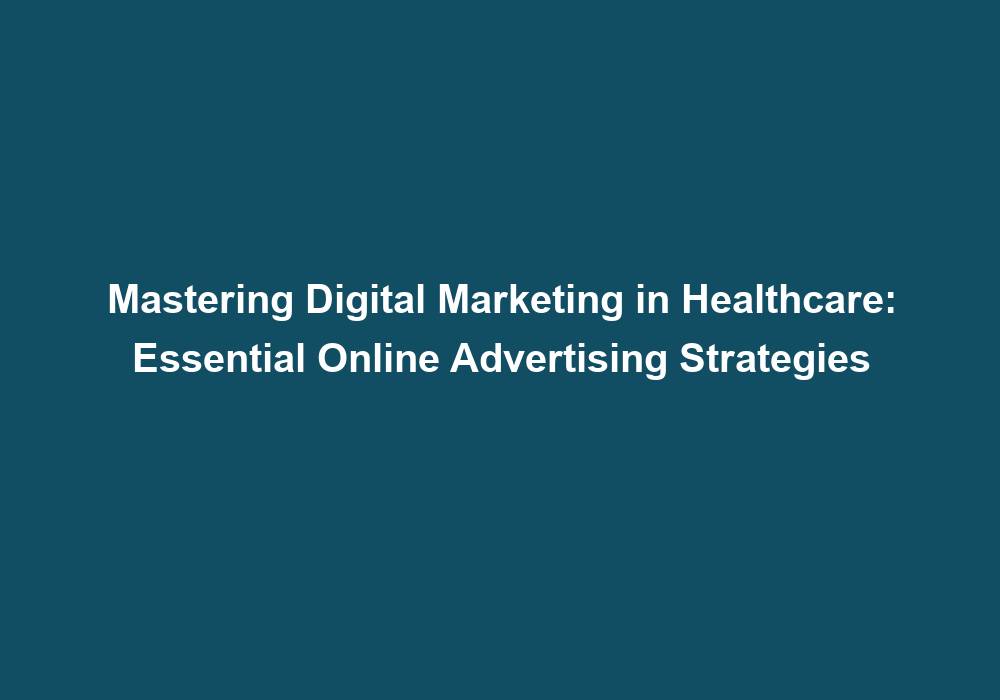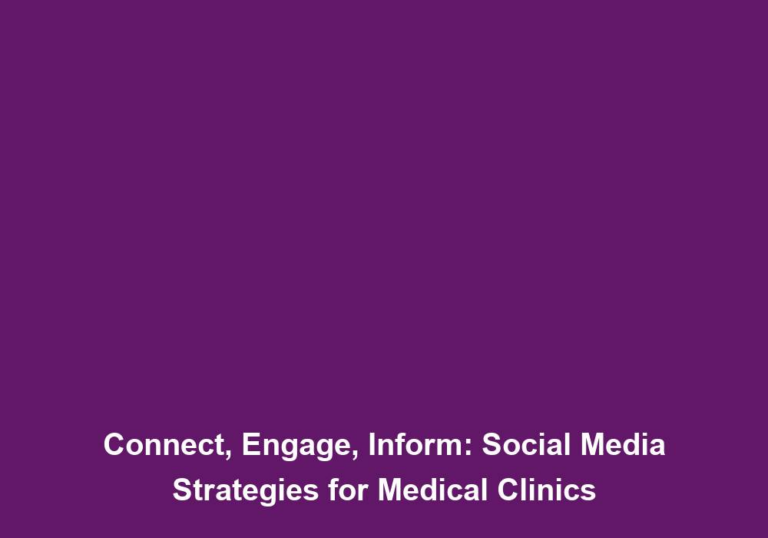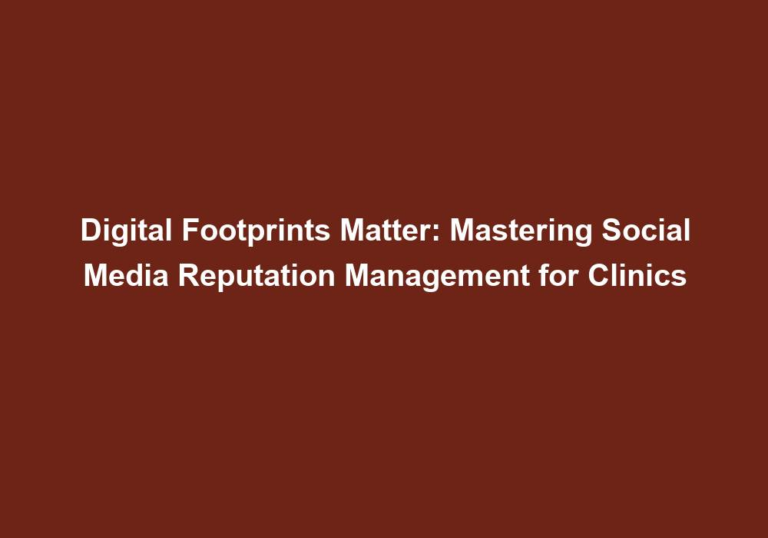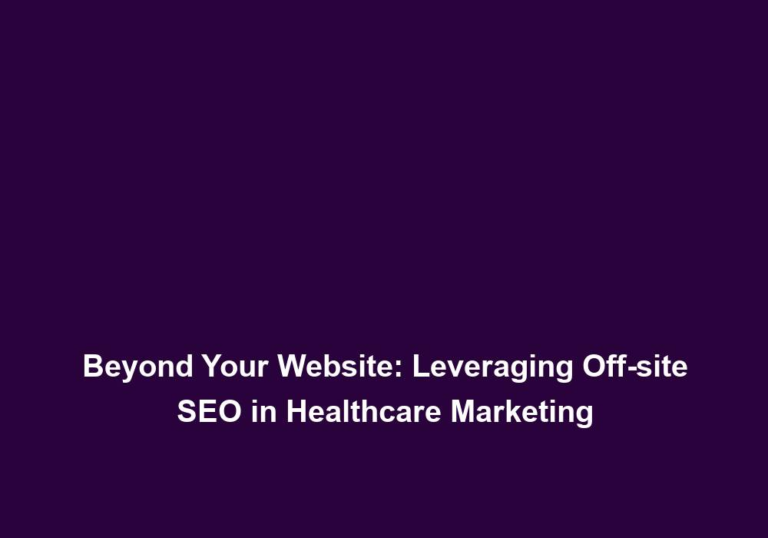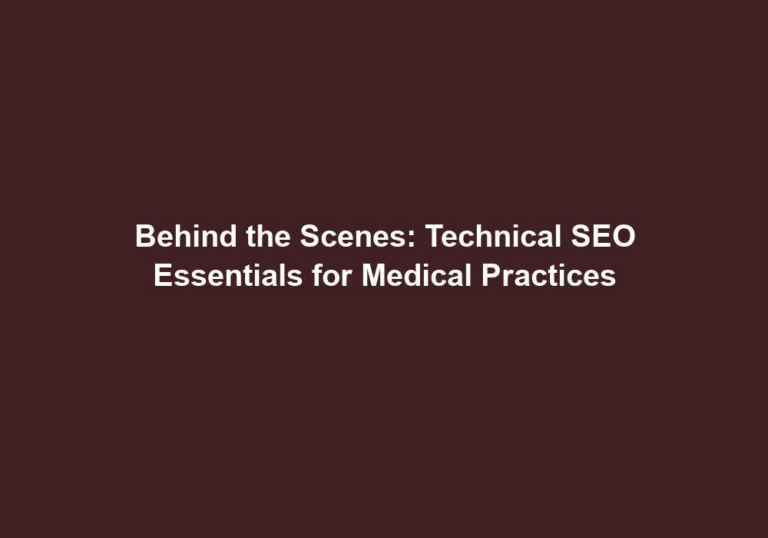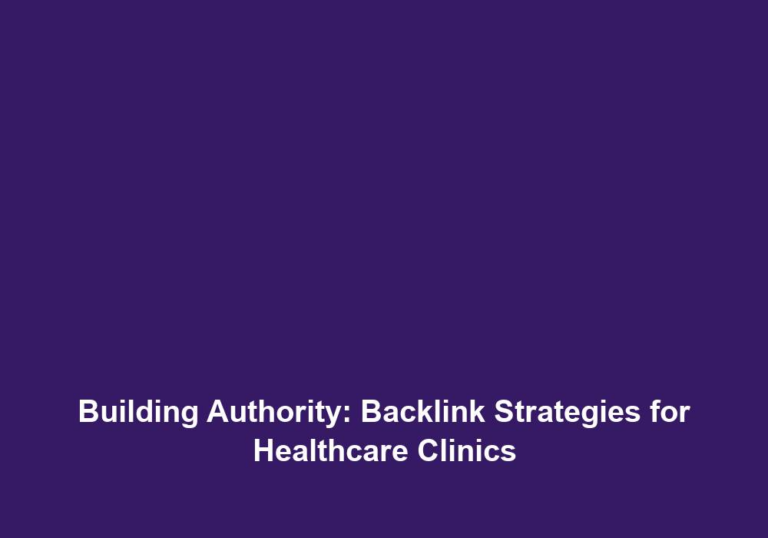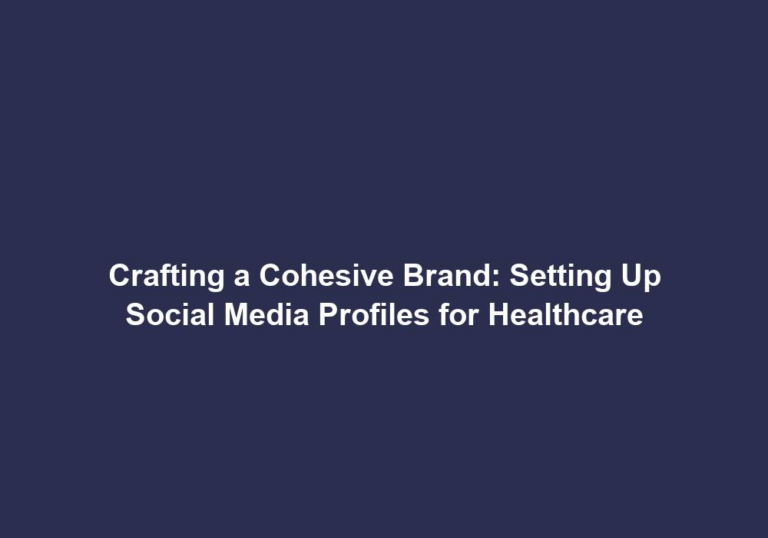Mastering Digital Marketing in Healthcare: Essential Online Advertising Strategies
In today’s digital age, it is crucial for healthcare providers to embrace digital marketing strategies to effectively reach and engage with their target audience. With the increasing reliance on digital platforms in seeking healthcare information and services, mastering online advertising is essential for staying ahead in the competitive healthcare industry. In this article, we will explore essential online advertising strategies that can help healthcare providers optimize their digital marketing efforts.
The Importance of Online Advertising in Healthcare
Digital marketing has revolutionized the way healthcare providers connect with patients, build brand awareness, and promote their services. Here are some key reasons why online advertising is crucial in the healthcare industry:
-
Increased Online Presence: By utilizing online advertising strategies, healthcare providers can enhance their online visibility and expand their reach to a wider audience. This allows them to connect with potential patients who are actively searching for healthcare services, increasing the chances of conversions and appointments.
-
Targeted Campaigns: Online advertising allows healthcare providers to specifically target their ideal patient demographic, ensuring that their messages are seen by those most likely to engage with their services. By understanding the unique needs and preferences of their target audience, healthcare providers can tailor their advertising campaigns to resonate with potential patients on a more personal level.
-
Cost-Effectiveness: Compared to traditional forms of advertising, digital marketing offers a cost-effective solution, allowing healthcare providers to achieve maximum reach within their marketing budgets. With online advertising, providers have the flexibility to set budget limits and only pay for the actual engagement received, such as clicks or conversions. This helps optimize their advertising spending and ensures a higher return on investment.
-
Measurable Results: Online advertising provides the ability to track and measure the effectiveness of campaigns in real-time. This data-driven approach allows healthcare providers to optimize their strategies and achieve better results over time. By analyzing key metrics such as click-through rates, conversion rates, and cost per acquisition, providers can identify areas for improvement and make data-backed decisions to enhance their digital marketing efforts.
Now, let’s delve into some essential online advertising strategies that healthcare providers should focus on to master digital marketing.
1. Search Engine Optimization (SEO)
Search Engine Optimization (SEO) is the process of optimizing a website to rank higher in search engine results pages (SERPs). By implementing SEO best practices, healthcare providers can increase their organic visibility and attract more relevant traffic to their websites. Here are some key aspects to consider for effective SEO:
- Conduct keyword research to identify the most relevant and high-volume search terms related to your healthcare services. By understanding the specific keywords that potential patients are using to search for healthcare information, providers can tailor their website content to align with these queries and improve their chances of appearing in relevant search results.
- Optimize your website’s meta tags, including title tags, meta descriptions, and header tags, with targeted keywords. These elements provide search engines with important information about your website’s content and help improve its visibility in search results.
- Create valuable and informative content that is optimized for both users and search engines. By developing content that addresses common healthcare concerns, provides valuable insights, and offers solutions to patients’ problems, healthcare providers can establish themselves as thought leaders in their field and attract organic traffic to their websites.
- Optimize your website’s loading speed and ensure it is mobile-friendly for a seamless user experience. A fast-loading and mobile-friendly website not only improves user satisfaction but also contributes to higher search engine rankings.
- Build high-quality backlinks from reputable healthcare websites to enhance your website’s authority. Backlinks from authoritative sources act as endorsements for your website, signaling to search engines that your content is trustworthy and relevant. This can positively impact your website’s search engine rankings.
2. Pay-Per-Click (PPC) Advertising
Pay-Per-Click (PPC) advertising is a highly effective online advertising strategy that allows healthcare providers to display ads on search engines and social media platforms. With PPC, healthcare providers can target specific keywords and demographics, paying only when someone clicks on their ads. Here’s how to make the most out of PPC advertising:
- Conduct thorough keyword research to identify relevant and high-intent keywords to target in your campaigns. By understanding the keywords that potential patients are using to search for healthcare services, providers can create targeted PPC campaigns that increase the chances of attracting qualified leads.
- Create compelling ad copy that highlights the unique value proposition of your healthcare services. Use persuasive language, clear calls-to-action, and relevant keywords to make your ads stand out and entice users to click.
- Use ad extensions to provide additional information and enhance the visibility of your ads. Ad extensions, such as site links, call extensions, and location extensions, allow healthcare providers to provide more context about their services and make their ads more informative and appealing to potential patients.
- Continuously monitor and optimize your campaigns based on performance data, ensuring maximum ROI. Analyze key metrics such as click-through rates, conversion rates, and cost per click to identify underperforming keywords or ad variations. By making data-driven adjustments, healthcare providers can refine their PPC campaigns and maximize their advertising budget.
3. Social Media Advertising
Social media platforms have become integral in our daily lives, and healthcare providers can leverage these platforms for effective online advertising. With social media advertising, healthcare providers can target specific demographics, engage with potential patients, and build brand awareness. Here are some tips for successful social media advertising:
- Identify the social media platforms that align with your target audience demographics and objectives. Different platforms attract different user demographics, so it’s essential to choose the ones that are most relevant to your healthcare services.
- Create engaging and informative content that resonates with your target audience. Use a mix of text, images, videos, and infographics to capture attention and communicate your key messages effectively.
- Utilize targeting options to reach specific demographics, interests, and behaviors. Social media platforms offer robust targeting capabilities that allow healthcare providers to narrow down their audience and ensure their ads are seen by the right people.
- Encourage user-generated content and positive reviews to build trust and credibility. Social proof plays a significant role in healthcare decisions, so encourage patients to share their experiences and reviews on social media. This can help build trust and attract more potential patients to your services.
4. Content Marketing
Content marketing involves creating and distributing valuable and relevant content to attract and engage a target audience. In healthcare, content marketing plays a pivotal role in establishing expertise, building brand trust, and driving patient engagement. Here are some content marketing strategies for healthcare providers:
- Develop a content strategy that aligns with your target audience’s needs and interests. Understand the healthcare topics that are most relevant to your audience and create content that addresses their specific concerns and challenges.
- Create informative blog posts, articles, and videos that address common healthcare concerns and provide valuable insights. Use a mix of educational content, expert interviews, patient stories, and updates on the latest healthcare trends to keep your audience engaged.
- Optimize your content for search engines to increase its visibility and reach. Conduct keyword research and incorporate relevant keywords naturally into your content. Also, focus on creating high-quality content that is shareable and link-worthy to attract backlinks and improve your website’s authority.
- Share your content across various digital platforms and engage with your audience through comments and social media interactions. Actively promote your content on social media, email newsletters, and other relevant channels to increase its reach and encourage discussions with your target audience.
5. Email Marketing
Email marketing remains one of the most effective ways to nurture leads, build relationships, and drive conversions. By implementing a targeted email marketing strategy, healthcare providers can stay in touch with patients, promote services, and provide valuable healthcare information. Here are some key considerations for successful email marketing:
- Segment your email list based on patient demographics, interests, or past interactions. By dividing your email list into smaller segments, you can tailor your email content to address the specific needs and interests of each group, increasing the relevance and effectiveness of your campaigns.
- Provide personalized and relevant content that addresses the specific needs and interests of each segment. Use dynamic content and personalization tokens to make your emails feel more personalized and engaging.
- Utilize automated email campaigns to nurture leads and guide patients through their healthcare journey. Set up automated email sequences that deliver targeted content at different stages of the patient lifecycle, such as welcome emails, appointment reminders, educational newsletters, and post-visit follow-ups.
- Monitor email open rates, click-through rates, and conversions to optimize your email marketing efforts. Use email analytics to track the performance of your campaigns and make data-driven adjustments to improve engagement and conversion rates.
In conclusion, mastering digital marketing in healthcare is essential for healthcare providers to effectively reach and engage with their target audience. By implementing these essential online advertising strategies – including SEO, PPC advertising, social media advertising, content marketing, and email marketing – healthcare providers can optimize their digital marketing efforts and achieve maximum results. Embrace the power of digital marketing and stay ahead in the ever-evolving healthcare industry.
Note: The article has been generated using Markdown format.

